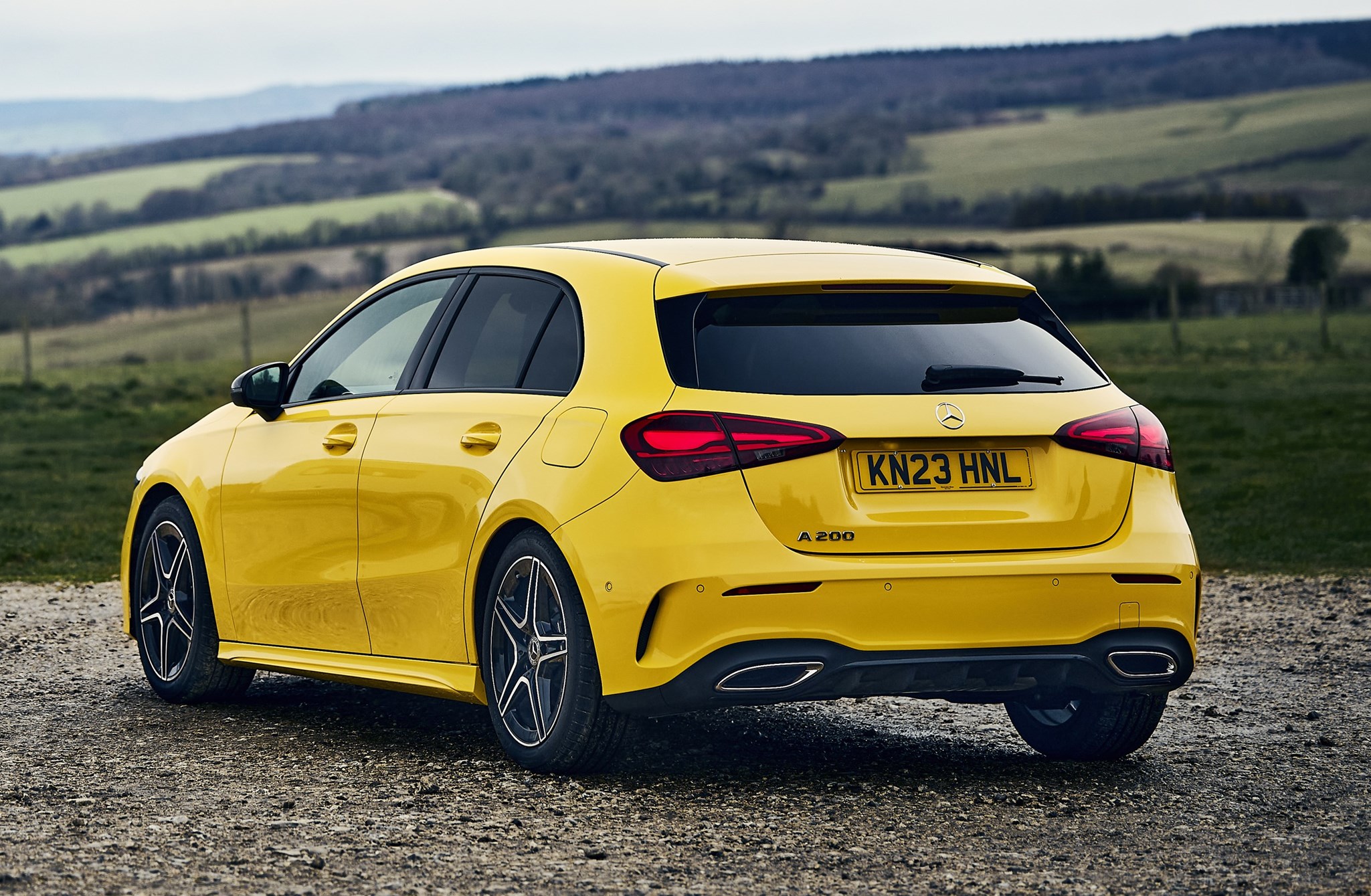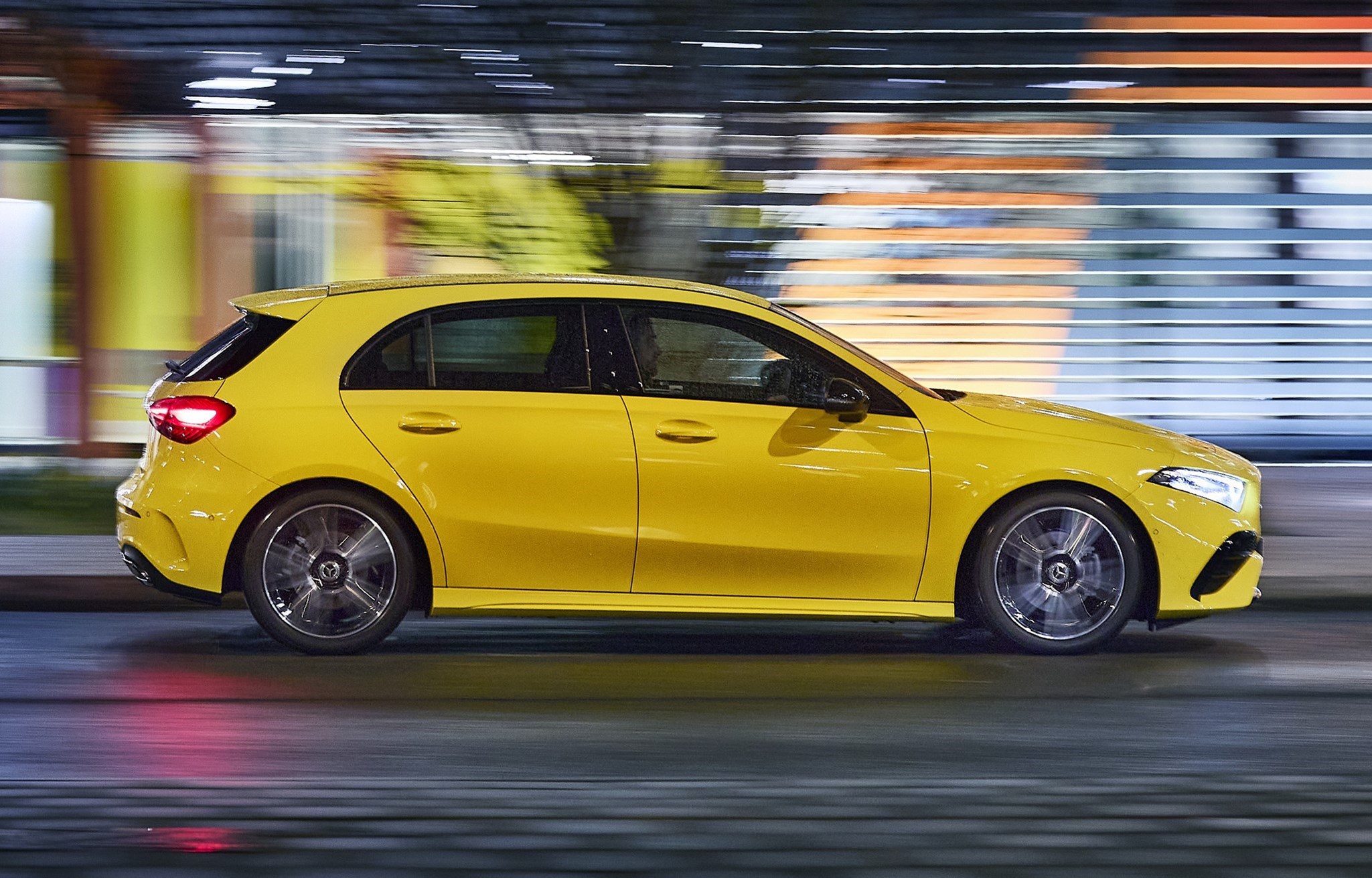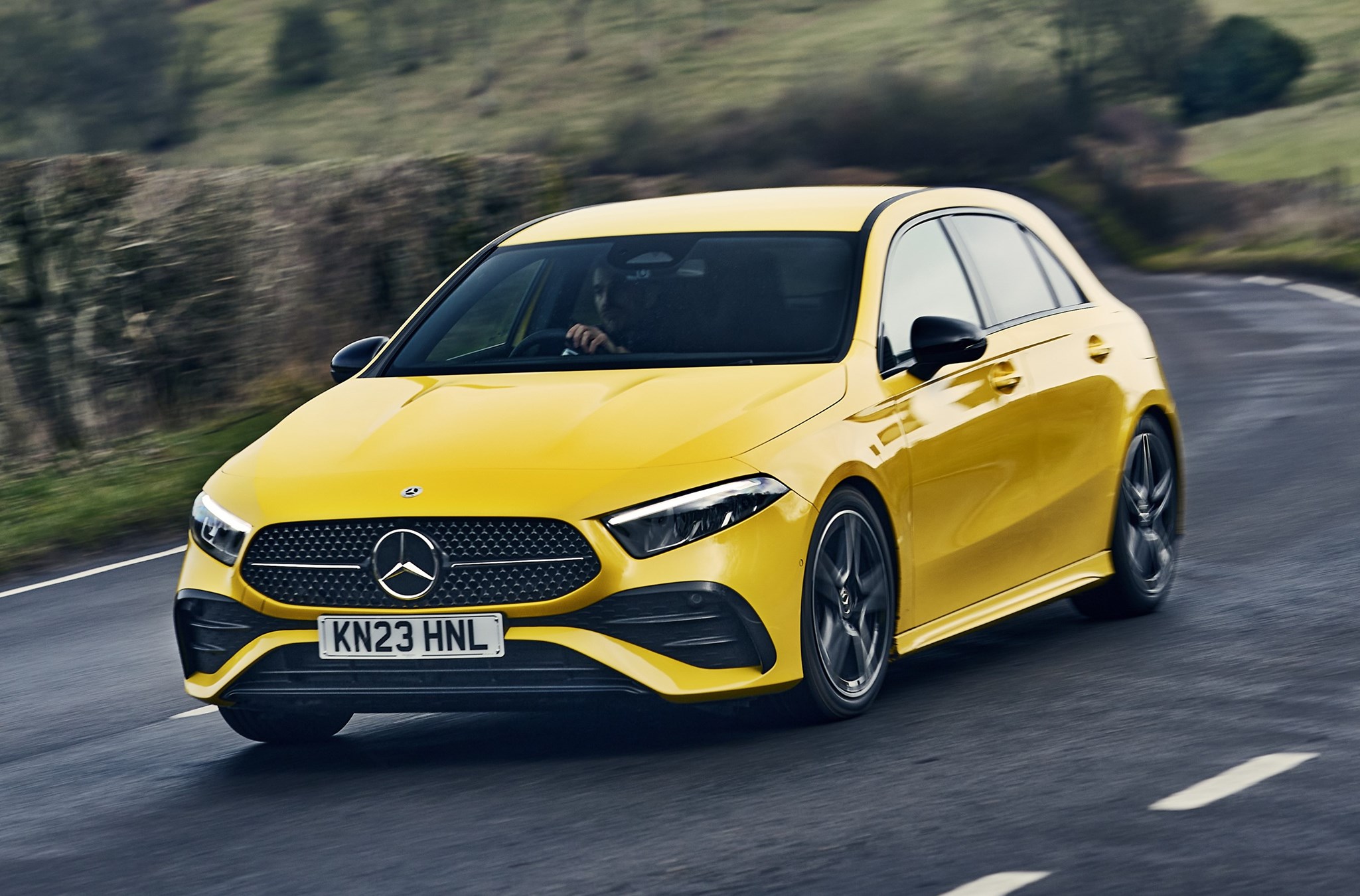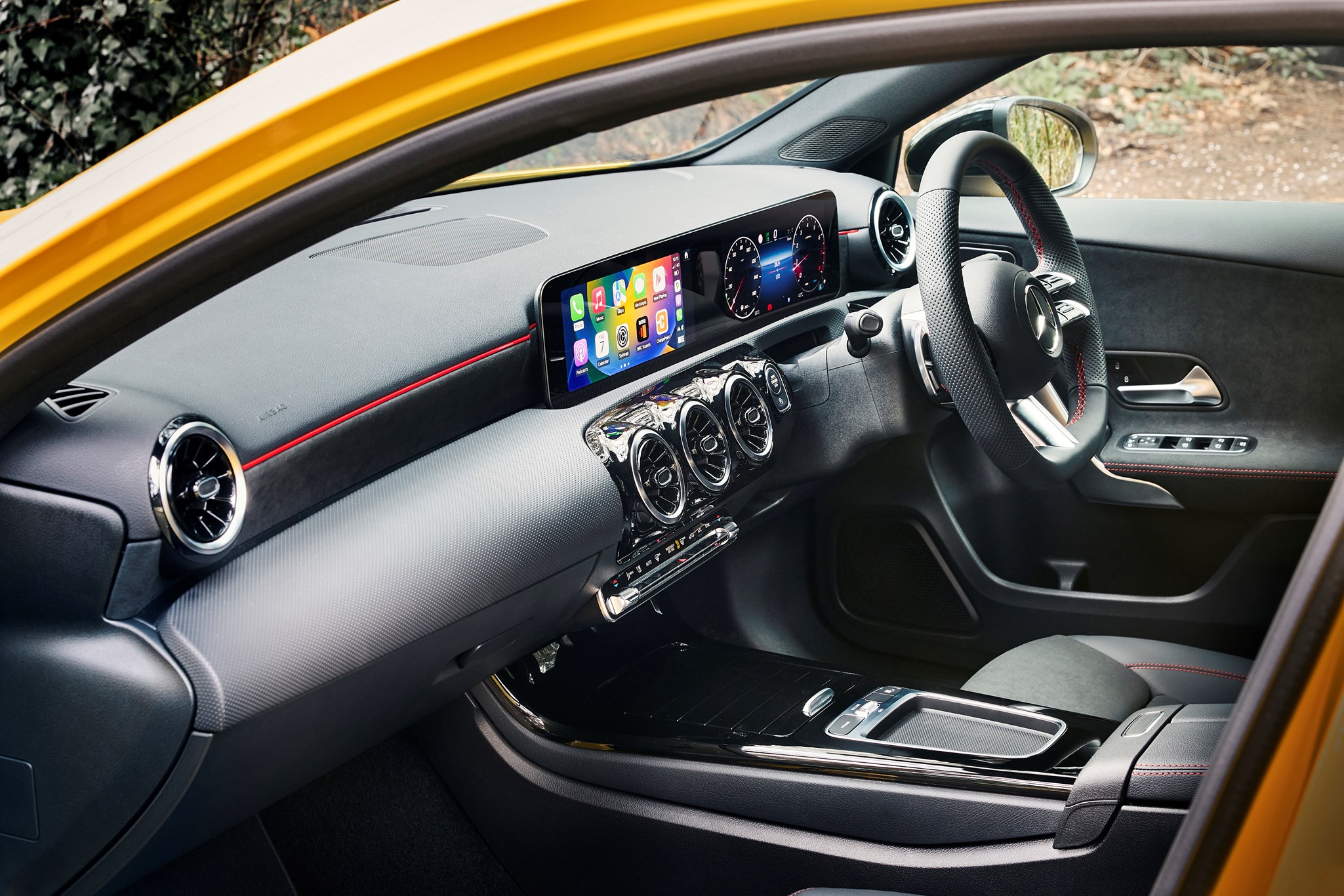► Posh hatchback rivals A3, 1 Series
► Petrol and diesel engines plus hot AMG models
► Majors on glitz and comfort
The market for premium hatchbacks is toughly fought, and Mercedes doesn’t really help itself out either. While its A-Class hatchback remains a popular option, it’s not short of internal competition. Customers wanting an SUV can opt for the GLA SUV, while for those who want something more traditional there’s the A-Class Saloon. More space required? The GLB has seven seats and rides on the same platform. Or, for maximum glamour, there’s the CLA four-door coupe and CLA Shooting Brake.
All this while Merc fights off the usual contenders from Germany and beyond – the BMW 1 Series and Audi A3 continue to provide strong competition, but posher rivals from below such as the VW Golf and Peugeot 308 are also encroaching on the same space.

With 2023’s update, Mercedes is hoping that the allure of the three-pointed star will still be enough to tempt buyers out of rivals’ showrooms. And, rather like a gentrified pub removing six pages of their menu and only offering the good stuff, it’s rationalised the A-Class model line-up, knocking off the outliers and concentrating on the core models.
What engines can I have in the 2023 Mercedes A-Class?
Putting aside for a moment the hot AMG A 35 and A 45 S models (which we’ve reviewed separately) Merc now offers just three engines for the A-Class hatch.
Two petrols are available, badged A 180 and A 200. They’re both based around the same 1.3-litre, four-cylinder Renault lump, paired to a seven-speed dual-clutch automatic transmission. The 180 puts out 134bhp, for a 9.2-second 0-62mph sprint, while the 200 has 161bhp and shaves a second off that time.
With no difference in official fuel economy and a £1,550 price gap, we’d opt for the more muscular 200 here. It’s a refined unit, pairing well with the seven-speed auto most of the time, though like most dual-clutch ‘boxes it can get confused at roundabouts or junctions. Both have a mild-hybrid ‘boost’, filling in some of the torque gaps and helping the stop-start system work more seamlessly.

Don’t discount the A 200 d diesel, though. Fuel economy in the 60s should be very possible on a long run, helped by the eight-speed auto’s long gearing and the A-Class’s slippery shape. If you’re a private buyer who does a lot of motorway mileage, there’s plenty to recommend this. With 148bhp on tap it’s a perfect match for the VW Golf TDI or BMW 118d.
Want an updated version of the A 250 e plug-in hybrid? Tough luck. Merc’s dropped it from the hatchback’s lineup and it’s now only available on the A-Class Saloon. An odd choice, in our book, as the 250 e made for a very convincing small company car.
What’s it like to drive?
The 2023 facelift has had no effect on the chassis, which means it’s quite well resolved although not a patch on the BMW 1 Series for driver involvement. It grips well and corners flat, with accurate steering, but there’s not much feedback involved. You’ll have to go for an AMG model if you want a sporting drive.

The A-Class rides bumps well for the most part. Though the ride can get pattery around town or on bad roads, especially on larger wheels, it soaks up most larger bumps with ease. Refinement is also excellent – there’s a little road noise but the A-Class’s slippery shape and quiet engines mean a relaxed and calm atmosphere.
Exciting it is not, but the A-Class lives up to its premium brand with a generally relaxed and comfortable driving experience.
What’s it like inside?
Here you’ll find the 2023 facelift’s biggest changes. The infotainment system has been updated to the latest MBUX system, and Mercedes has followed BMW and Audi’s lead in making the infotainment touchscreen-only, removing the previous central touchpad.
This isn’t a wholly positive change, as the system was designed with the central controller in mind – that means it’s set quite far back in the dash, so you have to lean forward to interact with it. Certain aspects of the interface are rather small and fiddly, too, despite the screen’s large 10.25-inch measurement.
 Mercedes Benz A Class – A200 – March 2023
Ref: Mercedes_Benz_A-Class-027.JPG
Mercedes Benz A Class – A200 – March 2023
Ref: Mercedes_Benz_A-Class-027.JPG
You get another 10.25-inch screen for the dials, unlike the pre-facelift car where base-spec models came with a pair of 7.0-inch displays with rather a lot of bezel. Both screens are still set under a seamless piece of glass, giving an effect much like the current E-Class – though the latest cars such as the C-Class and electric models have a newer, portrait-oriented display.
Interior quality is still something of a mixed bag. In places it’s lovely – the cool metal on the doors and the heavy, solid air vents are both highlights. But there are still areas where you poke and find a pronounced creak, and the haptic controls on the steering wheel are still as infuriating as ever. Rather a lot of piano black plastic, too.
Space is good, and the window line doesn’t rise towards the rear so even back-seat passengers get a good view out and plenty of light. The boot opening’s a little narrow but the space inside is on par with rivals and wide and uncluttered.
Trim levels are similar to the pre-facelift model, so they start with the pompously named ‘Sport Executive’ before running through AMG Line Executive, AMG Line Premium and AMG Line Premium Plus. A limited-run launch edition is available with the 200 petrol only.
Verdict
There are no surprises here, except perhaps how mild the A-Class’s mid-life facelift is. Why fix what isn’t broken, we suppose – it still sells exceptionally well.

Consider the A-Class if you want a posh-feeling car with a premium badge and are more concerned with technology and image than you are with driving dynamics. The BMW 1 Series is still, we think, a better all-round package, while the Audi A3 remains a solid contender.
With cars like this it often comes down to the finance packages on offer, so your mileage may vary depending on when you buy.